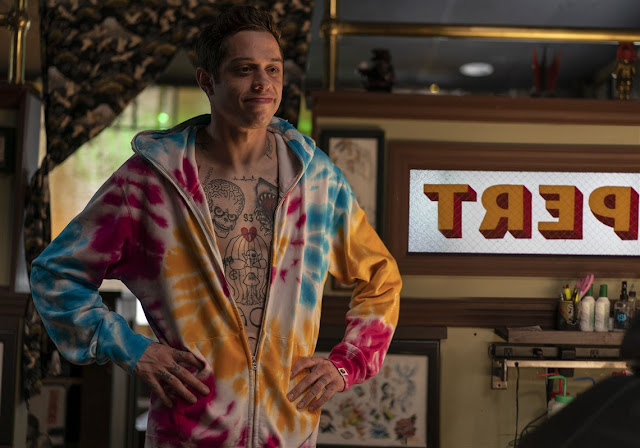The King of Staten Island Review
(A version of this article originally appeared on kernelnow.com / mynewslike.com)
Amongst the many traits common in Judd Apatow’s work is a penchant for taking aspiring comedians and launching their film careers – occasionally, all the way to superstardom. With his latest release The King of Staten Island, Apatow may well have done so again with Pete Davidson.
This is the story of Scott (Davidson), a 24 year-old who outside of a barely-developed dream to be a tattoo artist has little in the way of life goals. In a state of arrested development and fighting a range of afflictions from ADD to depression rooted and amplified by the tragic long-ago death of his firefighter father, Scott lives at home and mainly just gets high with his similarly indifferent friends. Things change, however, when his mother Margie (Marisa Tomei) begins her first serious relationship since the death of her husband with – much to Scott’s horror – another firefighter, Ray (Bill Burr).
After his (very) brief appearance in Trainwreck, Davidson probably now qualifies as a member of “Team Apatow”, which in its past has included stars the likes of Seth Rogen, Paul Rudd, Jonah Hill and Leslie Mann. Just like those previous headliners and their films, this may well end up being the performance which will be most closely associated as having pushed its lead to the next level. For all his existing work as a stand-up and Saturday Night Live regular, Davidson may be best known to some as “Ariana Grande’s ex”; though it never comes as across anything less than natural, this display is perhaps a statement of intent from the comedian to establish himself as something altogether more capable, with his surprisingly-touching, honest portrayal of Scott being the film’s strongest attribute.
 |
| Davidson’s Scott has got a lot going on in almost every way imaginable (source: Universal Pictures) |
If further evidence of his skill was needed, it should come from his scriptwriting here. It’s a semi-autobiographical tale, based on the personal struggles that Davidson underwent after losing his real-life father in the September 11 attacks, and though Apatow (with fellow co-writer Dave Sirus) has obviously added his own personal polish he wisely has withdrawn the complete “Apatow Treatment” so as to spotlight its conflicted lead character. Audiences will also find themselves in a state of deep conflict; Scott is a figure of sympathy and you will find yourself rooting for him to overcome his problems, but he also sometimes comes across as deliberately immature, making decisions that any viewer will probably think are ridiculous – stupid, even.
What’s most curious at first glance about this film is that it doesn’t have the quintessential Apatow story beats – after all, though his name was absent from the writing credits of Trainwreck that film offered a plot much more in keeping with the director’s prior efforts. But taking a closer look, it’s clear where his experienced hand most heavily guided the screenplay – in the background cast and world-building. Davidson obviously needed little help fleshing out his own image for the protagonist, but Apatow likely helped transform the character into an East Coast version of Knocked Up’s fast-talking Ben Stone (Seth Rogen), which in turn develops Scott’s posse into a basement-dwelling re-imagining of Ben’s housemates (special mention should go to increasingly-impressive former Disney star Moises Arias). It could also be said that this New York setting is now becoming as identifiably “Apatowian” as the California locales of Knocked Up and beyond, although like the busy streets of Trainwreck’s Big Apple the often-mocked borough of Staten Island is much more of a character informing this film than those earlier sun-bleached backdrops.
 |
| Scott (Pete Davidson, left) and Ray (Bill Burr) attempt to bond (source: Universal Pictures) |
It’s unfortunate that a near-miss around the film’s halfway point prevents us from spending too much time in the stoners’ company, but then the film does then take on an admittedly lighter but still intense Funny People esque dynamic in the relationship between Scott and Ray. Famed comedian Burr once again gives a sharp dramatic turn, this time with a fierce authoritarian moustache as he tightropes his mutually reluctant positioning as Scott’s new rudder in life; he’s helped by his tight firefighting crew, led by the iconic Steve Buscemi whose positioning here as a wise, elder statesman might take some getting used to. It all leads to a very different kind of camaraderie than we’ve seen in the fifteen-plus years of Apatow’s storytelling career, a much more singular showcase of its star’s storytelling abilities.
That the film exists as two separate halves might come as a sticking point to some, as the houseparty comedy that is the film’s first hour gives way to a profound journey of self-help for the remainder. It’s like the two dueling ideologies of The 40-Year-Old Virgin were stripped of their concrete end goal and split into a pair of distinct acts, and of course there will be fans of foul-mouthed comedy who will have little interest in journeys of personal growth, and vice versa. It’s not as if the film’s sentiments feel detached, but rather that this is a much more indie sensibility than expected of what would be, under normal circumstances, a big ticket theatrical comedy release.
 |
| The film also champions the bravery of firefighters like Papa (Steve Buscemi, left) (source: Universal Pictures) |
As the film coalesces in its final moments, reuniting much of what we’ve come to experience over the last 136 minutes, the story embraces the classic Apatow finish as we see that there’s a future for these people even as we might not be shown it. This is a warm and distinguished comedy with an admittedly-warped sense of “feel-good”, and as you turn the corner on this misfit group you come to realize something: where once this film-maker’s outings developed “credible human beings”, with the benefit of an outside voice and characters putting their lives on the line, for the first time he has realized “credible real-life heroes”.



Comments
Post a Comment